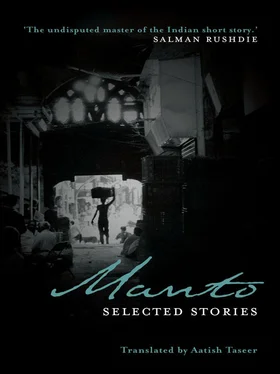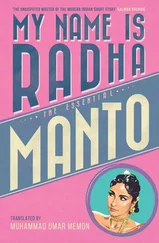Having said this, the challenges of translating Manto are considerable. What is rich, fluent prose in Urdu can appear florid in English; Manto leaves loose ends, his sentences can be mangled. He also becomes a victim of his form, namely the short story’s dependence on trick and surprise endings. David Coward, in his introduction to Maupassant’s stories, writes,
For the short story, while admitted to be extremely difficult to manage successfully, has long been regarded as somehow second rate, not least because it is generally felt to suffer from Cleverness. Perhaps it requires too much control, so that the reader feels manipulated, and because many short stories depend so much on irony or sudden reversals, they may seem overcontrived — like a joke which, once told, loses its tension.
For the reader of the novel especially, this kind of ending can be hard to stomach. In stories like ‘My Name is Radha’, and even ‘Licence’, one is almost left wishing for an unfinished ending rather than the one of high drama. And yet, I feel in the end, it is better for the translator to lay himself at the feet of his subject than try, at this late stage, to tidy him up, especially when dealing with as natural and gifted a writer as Manto. Translations are often criticised for being too literal, but in the case of Manto’s translators, I feel they haven’t been literal enough, that they have tried to rewrite the stories. This translation aims at being very literal, relishing especially, the feeling of the other language breaking through. The stories I have selected are only a few, but they show Manto’s range both in style and subject.
The translations became a way for me, with my mixed heritage, to limit the effects of the intellectual partition Manto feared. The linking of language to religion, followed by the partition along religious lines, has left the subcontinent’s intellectual past fenced up and pitted with no go zones; it has constantly to be sorted through, constantly to be excavated and reclaimed. The translations were part of a larger feeling in me that I would rather end up with Sanskrit and Urdu than neither. It was English, both for its impartiality and the opportunity its literary life offers, that made this possible. And for the same reasons, translations of Manto into English become important. It is a strange truth about Indian intellectual life that the road to rediscovering a writer like Manto in the original is bound to run first through English.
But for those without English, men like Zafar Moradabadi, who became an Urdu poet when it was still possible to do so, the currents of intellectual life have washed them up on less secure shores.
Zafar lives in the Sui Valan section of the old city of Delhi. I went to his house for the first time one smoky December night, on Eid. He picked me up outside Delite cinema, admonishing me for bringing him flowers and sweets. As we entered the old city, some men from the abattoir were unloading a truckload of meat. The rickshaw splashed through a pale, brownish-red puddle; the smell and the frenzy of flies gave it away as blood. Narrow streets, crowded that night with bright kerosene lights and people in their new clothes, led to Zafar’s house. We arrived in front of a darkened entrance. Near an open drain, a bitch tended to her family of fluffy grey puppies. A flight of steep stone stairs, chipped at the edges, led up to a pale green door and a landing, lit by a single light.
Zafar had warned me many times on the way how small his house was. ‘But the hearts of the people in it are big,’ he added. I had imagined his house would be a small flat, with a kitchen, a bathroom, two rooms perhaps, at least room enough to stand up, to walk around. But Zafar’s house was a single room, no bigger than a carpet, covered with sheets of chequered cloth. Its pistachio green walls were high and there were shelves all around, stacked to the ceiling with hard suitcases and trunks so that it felt almost like being in a godown. Everything was neatly in its place: a sewing machine with a pink satin cover, necessary where clothes are repaired often; a little shelf with holy Zam Zam water, oils and a pair of scissors; green-covered copies of Zafar’s new book. There was no kitchen, just a ledge with pulses and grains stacked high on one side. Its stone surface was used for washing, the water disappearing through an opening in the floor. The bathroom was a single metal sheet, leading to a drain. Everything was hanging — towels, toothbrushes, clothes, including a green bra, all heaped over a nylon rope. The air was fetid and filled the little room.
Zafar’s family of five couldn’t physically fit in the room and he slept on the floor of a magazine office in another part of the old city, near Ghalib’s old house. He had once saved enough money to buy a better place. But in 1997, the year when the accounts had become computerised, his wife had fallen from the stairs and all his savings were spent on her treatment. She was there now, dressed in a black kameez with red flowers on it. She was a fat woman, with curly hair and pale skin. She was smiling, and though her face was made up, something in her eyes suggested damage, almost as if they were unused to emotions other than distress.
That night, as we ate a small feast on an oil cloth in the little room, a number of strong feelings occurred to me at once. There was the very romantic idea of the old city, even in total collapse, as still sheltering poets; there was the miracle of Zafar and his family retaining their refinement despite the squalor around them; there was also a feeling of dread for India, for any country that would let its men of learning live in conditions like these. When I thought harder about it, I was struck by how genteel and unlikely a calamity this was. Urdu had not died, but its literary culture in India had, and it had left its casualties, of which Zafar was one. His fate had been tied up with the fate of the language. I found it suddenly painful to think that the man who had helped me to understand and translate had himself ended up a prisoner of language. He had once said to me, ‘There is knowledge. Everything else comes and goes.’ But only now, seeing him in the poverty and decay that threatened always to diminish him, I understood how he must have clung to that exalted idea; and how at times, it must have been so difficult to defend. He had also reminded me, in relation to Urdu, that I had a tradition to uphold. The words then were just part of a lively argument; I hadn’t known about the life spent in service of that tradition, even as the infrastructure of literature collapsed around him. Zafar had also described himself as an intellectual mercenary. But here, as I’d found so often with him, he was only half right. There was no denying that the life that had aged him and left him covered in sores, himself like a tattered page out of Manto, had been a fighting life. But what had been fought for was not fortune, but his gentle manners, his decency and the six hundred years of poetry ready on his blackened lips. And watching Zafar Moradabadi sit back against the wall, smoking a Win cigarette, it was not so much the mercenary that came to mind as the martyr.
Aatish Taseer, New Delhi, 2008
She was playing with the little girls at the far end of the alley. Inside the chawl, her mother hunted for her everywhere. Kishori sat waiting in their room; someone had been told to bring him tea. Sarita’s mother now began searching for her on all three floors of the chawl. Who knew which hole Sarita had gone and died in? She even went into the bathrooms, yelling, ‘Sarita… Sarita!’ But Sarita, as her mother was beginning to realise, was not in the chawl. She was outside on the corner of the alley, near a heap of garbage, playing with the little girls, utterly carefree.
Читать дальше












